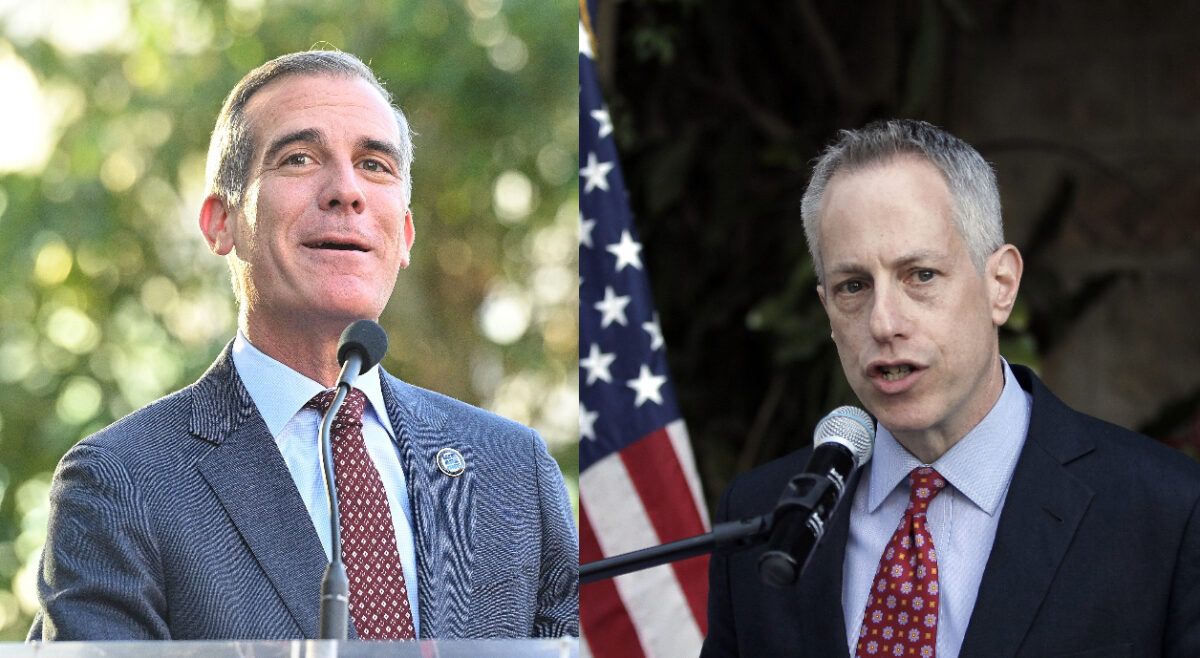Senate Foreign Relations approves Iraq AUMF repeal, advances Garcetti, Ratney nominations
Garcetti and Ratney’s confirmations remain in question after extensive delays for both nominees

Gilbert Flores/Variety via Getty Images /AHMAD GHARABLI/AFP via Getty Images
Eric Garcetti (left), Michael Ratney
The Senate Foreign Relations Committee voted on Wednesday to advance the long-delayed nominations of Eric Garcetti and Michael Ratney to be the U.S. ambassadors to India and Saudi Arabia, respectively, as well as to repeal past authorizations for use of military force (AUMFs) in Iraq.
The committee had previously voted in favor of Ratney and Garcetti’s nominations in the previous Congress, but was obligated to vote again in the new year after both nominations stalled on the Senate floor. Garcetti has faced bipartisan opposition over allegations that he was aware of accusations of sexual assault against a top aide in his Los Angeles mayoral office. Ratney was, and continues to be, opposed by Sen. Ron Wyden (D-OR) over issues relating to the Saudi regime.
Garcetti’s nomination was approved by a 13-8 vote; Sen. Jim Risch (R-ID), the committee’s ranking member, said that “new evidence” into the allegations “has raised enough questions regarding his judgment,” leading him to vote against Garcetti after supporting him last year. Sens. Todd Young (R-IN) and Bill Hagerty (R-TN) joined Democrats in voting for Garcetti. Garcetti continues to face opposition from at least one Democrat outside the committee, Sen. Mark Kelly (D-AZ) based on sexual assault-related allegations, and Risch’s opposition could further complicate his prospects for confirmation. Sen. Richard Blumenthal (D-CT) said last week that he’s still reviewing the situation.
Ratney’s nomination was approved by a voice vote, in a package with other nominees. Fast-track confirmation will remain out of reach as long as Wyden’s objection continues.
The committee also voted 13-8 to repeal the 1991 and 2002 AUMFs for Iraq. Some lawmakers from both parties have argued for several years that the AUMFs are outdated and no longer necessary for ongoing operations. The effort is expected to come to the floor in the coming weeks, with the support of Senate Democratic leadership.
Risch argued that the 2002 AUMF “has long been used to address threats emanating from Iraq such as Iranian-backed Shiite militias,” saying that he is “concerned about the message this repeal would send to the region as much as anything else,” a position shared by some fellow lawmakers. The 2002 AUMF was cited as a secondary authority in the 2020 strike that killed Iranian Gen. Qassem Soleimani in Iraq.
Supporters of the repeal argue that other authorities are primarily used in ongoing U.S. strikes and conflicts and that changing them will not impact the U.S.’ ability to strike at Iranian-backed groups in Iraq.
Sen. Ted Cruz (R-TX) proposed an amendment that would specify that the U.S. has the authority to attack Iran; it was voted down 13-8. An amendment from Sen. Rand Paul (R-KY) to also repeal the 2001 AUMF — which came in response to 9/11 and undergirds much of the ongoing War on Terror — was rejected by a 20-1 vote.
An unidentified senator on the committee asked that a vote on legislation aiming to create cooperative programs with Iraq and Arabian Peninsula nations to counter Iranian drones be postponed until the committee’s next meeting. Neither Risch nor Committee Chairman Bob Menendez (D-NJ), the bill’s sponsors, responded to inquiries about the delay.








